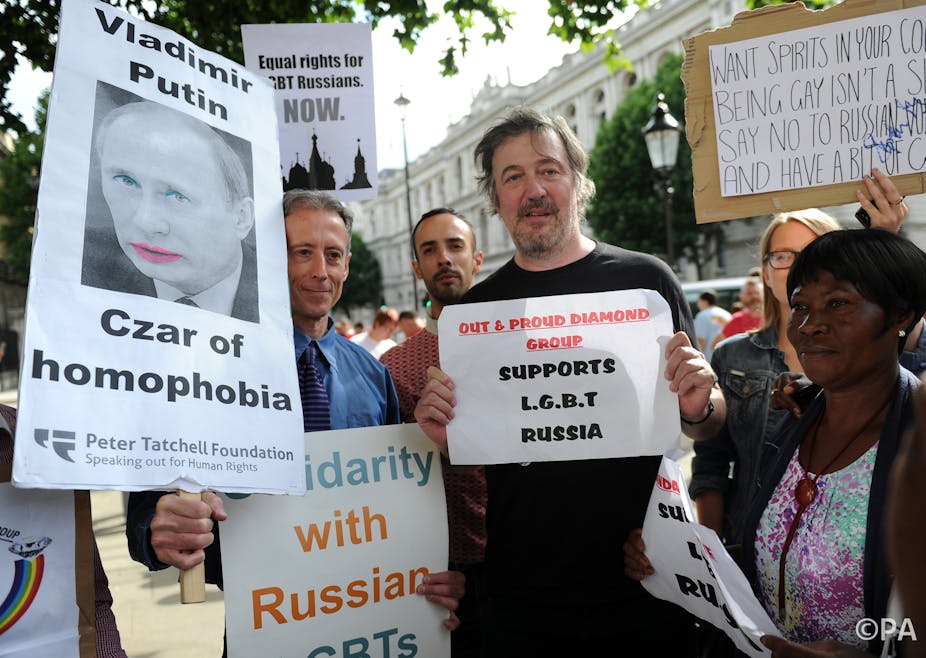Stephen Fry’s viral open letter calling for “an absolute ban” on the 2014 Winter Olympics in Sochi over Russia’s controversial new anti-homosexuality laws was a clarion call for activists. But it should be a call to arms for academics, too.
I don’t care much for sport, and as a musicologist my knowledge of the Olympics is essentially limited to the official song and the music of the opening and closing ceremonies. So prior to Fry’s intervention, my interest in this story was piqued largely by association with the anti-Putin protest staged by Russian punk band Pussy Riot in Moscow’s Christ the Saviour Cathedral 18 months ago.
Speaking personally, I have of course been appalled by the reports of the Russian authorities turning a blind eye to the beatings of gay rights campaigners. But in my professional capacity, I noticed an altogether different comment in Fry’s letter, namely:
Any statement, for example, that Tchaikovsky was gay and that his art and life reflects this sexuality and are an inspiration to other gay artists would be punishable by imprisonment.
For me, the ideological implications of legislation that denies the undeniable in relation to music history are both chilling and unfathomable. My research on musical biography centres around questions including the relationship between composers’ lives and their works.

It is a deeply uncomfortable thought that certain innocuous lines of enquiry I have explored in my scholarship, both about Tchaikovsky and others, might actually be construed as illegal in contemporary Russia. Should writers, historians and cultural critics face the threat of heavy fines or arrest just for telling the truth?
Tchaikovsky’s name has frequently been cited in the past few days as an example of a famous gay Russian. As one of the country’s greatest ever composers, but also the creator of such iconic musical celebrations of heterosexuality as Romeo and Juliet and Eugene Onegin, his sexual identity has long been a source of considerable unease.
Two stories have even come down to us about his death: the widely held one, that he died of cholera from drinking unboiled water; and a more recently emerged version, which claims he may have been forced by a committee of his peers to commit suicide to avoid his homosexuality bringing shame to his alma mater. But that was 120 years ago.
Closer to the present but also closer to home, we might consider the sobering tale of Britain and Britten. Section 28 of the Local Government Act 1988, which legislated against the promotion of homosexuality as a “pretended family relationship” (which all sounds worryingly familiar in light of the above), led directly to the cancellation of a special school staging of Benjamin Britten’s Death in Venice by Glyndebourne Touring Opera. In some respects, perhaps the forward-thinking UK is not so far behind Russia: Section 28 was repealed less than a decade ago.
Another subject of my research for more than 10 years is the fascinating, pathbreaking artist Ethel Smyth. Smyth overcame substantial (male) opposition to the notion of a woman composer in the late nineteenth and early twentieth centuries, writing six operas and many other musical works as well as twelve volumes’ worth of memoirs, biographical sketches and essays. She also dedicated two years of her life to the suffrage cause, becoming prominently involved; she and Emmeline Pankhurst may even have been lovers.
In an article published in 2004, I described Smyth’s sexual identity as having “provided a source of inspiration for her creative output and a basis for her opposition to male-dominated society”. This is exactly the kind of suggestion that Fry notes would be “punishable by imprisonment” in Russia today. But I passionately believe that it is both the historian’s duty and right to explore the truth – even if it may not always be what bigoted individuals want to hear.
When, two years ago, I spoke about Smyth alongside Fry’s sometime QI colleague Sandi Toksvig at The Women’s Library, London, there was no question of pretending that the composer was somebody she wasn’t. More recently it has been announced that Smyth and Britten are, deservedly, among those to be commemorated during LGBT History Month 2014. I can only begin to imagine what a loss it would be to the public advancement of knowledge if outdated, homophobic propaganda laws were to prohibit such legitimate avenues of scholarly investigation.

Tchaikovsky, Smyth and Britten merely scratch the surface of a vast international contribution to culture and the arts by homosexual-identified individuals across the centuries. During a recent module on Musical Theatre, for instance, I felt duty-bound to point out that one of the greatest works of the Broadway canon, West Side Story, was the product of a gay composer, a gay librettist, a gay lyricist and a gay choreographer-director.
There is, I suspect, a wider issue at stake here. Were legislation to preclude the academic exploration and discussion of basic sexual truths, we might successfully avoid one crime only to commit another far worse: a crime against scholarship, and therefore against humanity. We might as well start burning books.
Academia has a social responsibility to promote equality, to preserve knowledge in all its forms, and to raise awareness where history is infelicitously repeating itself or failing to heed its own lessons. Standing up and being counted shouldn’t merely be left to celebrities, even if that gets more results. On Friday, IOC president Jacques Rogge called upon Russia to clarify the impact of its anti-gay legislation on the upcoming Olympics; while David Cameron responded personally to Fry via Twitter the following day.
The threat of boycotting or moving the Winter Games – or even establishing a bespoke symbolic gesture that athletes might adopt by way of protest during the Olympics, as Fry suggested over the weekend – may or may not be the answer. But if it does turn out to be the high-profile message of disapproval that Putin needs to hear, then I hope academia will welcome it too.

